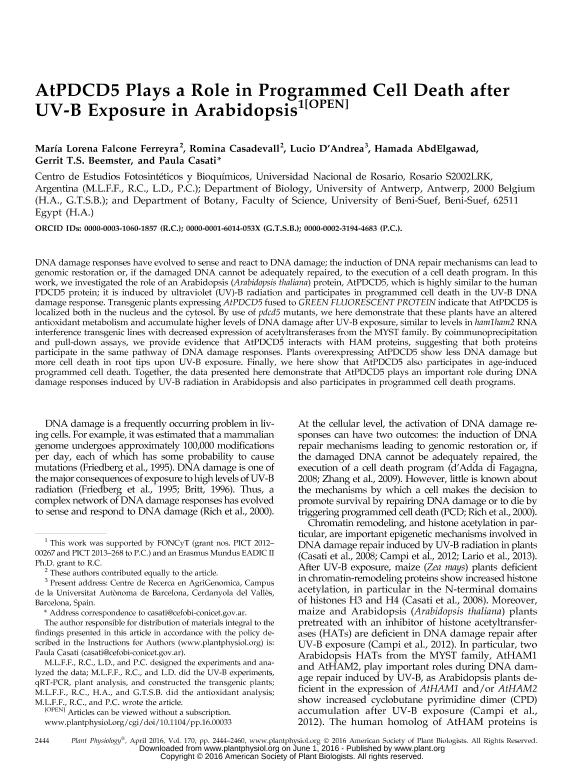Mostrar el registro sencillo del ítem
dc.contributor.author
Falcone Ferreyra, María Lorena

dc.contributor.author
Casadevall, Romina

dc.contributor.author
D'andrea, Lucio Jesus

dc.contributor.author
Abdelgawad, Hamada
dc.contributor.author
Beemster, Gerrit T.S.
dc.contributor.author
Casati, Paula

dc.date.available
2018-07-23T17:23:07Z
dc.date.issued
2016-04
dc.identifier.citation
Falcone Ferreyra, María Lorena; Casadevall, Romina; D'andrea, Lucio Jesus; Abdelgawad, Hamada; Beemster, Gerrit T.S.; et al.; AtPDCD5 plays a role in programmed cell death after UV-B exposure in arabidopsis; American Society of Plant Biologist; Plant Physiology; 170; 4; 4-2016; 2444-2460
dc.identifier.issn
0032-0889
dc.identifier.uri
http://hdl.handle.net/11336/52827
dc.description.abstract
DNA damage responses have evolved to sense and react to DNA damage; the induction of DNA repair mechanisms can lead to genomic restoration or, if the damaged DNA cannot be adequately repaired, to the execution of a cell death program. In this work, we investigated the role of an Arabidopsis (Arabidopsis thaliana) protein, AtPDCD5, which is highly similar to the human PDCD5 protein; it is induced by ultraviolet (UV)-B radiation and participates in programmed cell death in the UV-B DNA damage response. Transgenic plants expressing AtPDCD5 fused to GREEN FLUORESCENT PROTEIN indicate that AtPDCD5 is localized both in the nucleus and the cytosol. By use of pdcd5 mutants, we here demonstrate that these plants have an altered antioxidant metabolism and accumulate higher levels of DNA damage after UV-B exposure, similar to levels in ham1ham2 RNA interference transgenic lines with decreased expression of acetyltransferases from the MYST family. By coimmunoprecipitation and pull-down assays, we provide evidence that AtPDCD5 interacts with HAM proteins, suggesting that both proteins participate in the same pathway of DNA damage responses. Plants overexpressing AtPDCD5 show less DNA damage but more cell death in root tips upon UV-B exposure. Finally, we here show that AtPDCD5 also participates in age-induced programmed cell death. Together, the data presented here demonstrate that AtPDCD5 plays an important role during DNA damage responses induced by UV-B radiation in Arabidopsis and also participates in programmed cell death programs.
dc.format
application/pdf
dc.language.iso
eng
dc.publisher
American Society of Plant Biologist

dc.rights
info:eu-repo/semantics/openAccess
dc.rights.uri
https://creativecommons.org/licenses/by-nc-sa/2.5/ar/
dc.subject
Pdcd5
dc.subject
Uv-B Radiation
dc.subject
Senescence
dc.subject.classification
Otras Ciencias Biológicas

dc.subject.classification
Ciencias Biológicas

dc.subject.classification
CIENCIAS NATURALES Y EXACTAS

dc.title
AtPDCD5 plays a role in programmed cell death after UV-B exposure in arabidopsis
dc.type
info:eu-repo/semantics/article
dc.type
info:ar-repo/semantics/artículo
dc.type
info:eu-repo/semantics/publishedVersion
dc.date.updated
2018-07-18T20:42:40Z
dc.journal.volume
170
dc.journal.number
4
dc.journal.pagination
2444-2460
dc.journal.pais
Estados Unidos

dc.journal.ciudad
Rockville
dc.description.fil
Fil: Falcone Ferreyra, María Lorena. Consejo Nacional de Investigaciones Científicas y Técnicas. Centro Científico Tecnológico Conicet - Rosario. Centro de Estudios Fotosintéticos y Bioquímicos. Universidad Nacional de Rosario. Facultad de Ciencias Bioquímicas y Farmacéuticas. Centro de Estudios Fotosintéticos y Bioquímicos; Argentina
dc.description.fil
Fil: Casadevall, Romina. Consejo Nacional de Investigaciones Científicas y Técnicas. Centro Científico Tecnológico Conicet - Rosario. Centro de Estudios Fotosintéticos y Bioquímicos. Universidad Nacional de Rosario. Facultad de Ciencias Bioquímicas y Farmacéuticas. Centro de Estudios Fotosintéticos y Bioquímicos; Argentina
dc.description.fil
Fil: D'andrea, Lucio Jesus. Consejo Nacional de Investigaciones Científicas y Técnicas. Centro Científico Tecnológico Conicet - Rosario. Centro de Estudios Fotosintéticos y Bioquímicos. Universidad Nacional de Rosario. Facultad de Ciencias Bioquímicas y Farmacéuticas. Centro de Estudios Fotosintéticos y Bioquímicos; Argentina
dc.description.fil
Fil: Abdelgawad, Hamada. Universiteit Antwerp; Bélgica. University of Beni-Suef; Egipto
dc.description.fil
Fil: Beemster, Gerrit T.S.. Universiteit Antwerp; Bélgica
dc.description.fil
Fil: Casati, Paula. Consejo Nacional de Investigaciones Científicas y Técnicas. Centro Científico Tecnológico Conicet - Rosario. Centro de Estudios Fotosintéticos y Bioquímicos. Universidad Nacional de Rosario. Facultad de Ciencias Bioquímicas y Farmacéuticas. Centro de Estudios Fotosintéticos y Bioquímicos; Argentina
dc.journal.title
Plant Physiology

dc.relation.alternativeid
info:eu-repo/semantics/altIdentifier/doi/https://dx.doi.org/10.1104/pp.16.00033
dc.relation.alternativeid
info:eu-repo/semantics/altIdentifier/url/http://www.plantphysiol.org/content/170/4/2444
Archivos asociados
